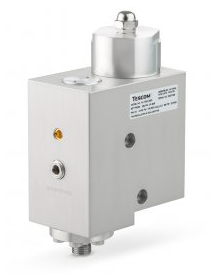From EmersonReviewed by Lexie CornerMay 29 2024
Emerson has launched the TESCOMTM HV-7000 Series two-stage pressure-reducing regulator, which is designed to maximize fuel efficiency an improve reliability in hydrogen-powered vehicles. Easy to install, HV-7000 Series regulators provide stable pressure delivery, high reliability, and long service life for heavy-duty vehicles powered by fuel cells or hydrogen combustion engines.

Image Credit: Emerson
The HV-7000 features two-stage pressure reduction and a positive seal designed to deliver hydrogen to the fuel cell at optimal pressure in all flow conditions, even as the vehicle hydrogen storage tank depletes. The two-stage pressure reduction significantly lessens decaying inlet characteristic compared to single-stage regulators, while the positive seal design offers superior shut-off performance. Together, these features can minimize fueling costs, as well as the risk of downstream component failure and downtime.
“Reliable vehicles with superior fuel efficiency are valuable assets that minimize total cost of ownership and maximize road time for companies operating fleets of hydrogen-powered trucks or buses,” said Fabrice Jannet, director business development for hydrogen with Emerson’s discrete automation business. “A profitable fleet starts at the component level. That’s why the TESCOM HV-7000 Series is engineered for automotive purpose, with a range of innovative features that boost hydrogen fuel efficiency and reliability in a design that is easy for system integrators to install.”
The most common cause of regulator failure is contamination, which can damage soft goods such as seats and seals, causing leakage and vehicle downtime. HV-7000 features such as tied valve stems, integrated filters and patented redundant seals make the regulator contamination-resistant, improving vehicle service life and extending time on the road.
The redundant seal design extends cycle life if one seal experiences wear; the filter catches solid particles produced during installation before they can contact soft goods, and the tied valve stem counteracts seat contamination and wear. Preventing contamination and resulting leaks can help avoid fuel loss, safety hazards, system damage and equipment downtime.
In addition to its benefits for the vehicle user, the HV-7000 is also designed to help fuel cell system manufacturers and integrators assemble the regulator into their system as quickly as possible. The regulator is compact and lightweight, with a flat shape and mounting holes designed specifically for mounting the regulator against other flat surfaces in the system. Such easy installation helps reduce manufacturing and procurement costs and eases scale-up as production volumes increase compared to other pressure regulation technologies.